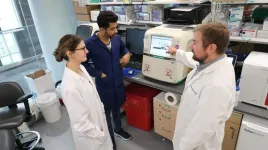(Press-News.org) The dental health benefits of adding fluoride to drinking water may be smaller now than before fluoride toothpaste was widely available, an updated Cochrane review has found.
The team of researchers from the Universities of Manchester, Dundee and Aberdeen reviewed the evidence from 157 studies which compared communities that had fluoride added to their water supplies with communities that had no additional fluoride in their water. They found that the benefit of fluoridation has declined since the 1970s, when fluoride toothpaste became more widely available.
The contemporary studies were conducted in high-income countries. The impact of community water fluoridation in low- and middle-income countries is less clear, due to the absence of recent research.
Fluoride, used in many commercially available toothpastes and varnishes, is known to reduce tooth decay. Governments in many countries have added fluoride to the drinking water supply to improve population oral health, although there are polarized views on whether this is the right action to take.
“When interpreting the evidence, it is important to think about the wider context and how society and health have changed over time,” says co-author Anne-Marie Glenny, Professor of Health Sciences Research at the University of Manchester. “Most of the studies on water fluoridation are over 50 years old, before the availability of fluoride toothpaste. Contemporary studies give us a more relevant picture of what the benefits are now.”
Results from studies conducted after 1975 suggest that the initiation of water fluoridation schemes may lead to slightly less tooth decay in children’s baby teeth. Analysis of these studies, covering a total of 2,908 children in the UK and Australia, estimates that fluoridation may lead to an average of 0.24 fewer decayed baby teeth per child. However, the estimate of effect comes with uncertainty, meaning it’s possible that the more recent schemes have no benefit. By comparison, an analysis of studies with 5,708 children conducted in 1975 or earlier estimated that fluoridation reduced the number of decayed baby teeth, on average by 2.1 per child.
The same contemporary studies (conducted after 1975) also looked at the number of children with no decay in their baby teeth. The analysis found that fluoridation may increase the number of children with no tooth decay by 3 percentage points, again with the possibility of no benefit.
The review was only able to draw conclusions about the impact on children’s teeth, with similar findings across both baby and permanent teeth. There were no studies with adults that met the review’s criteria.
“The evidence suggests that water fluoridation may slightly reduce tooth decay in children,” says co-author Dr Lucy O’Malley, Senior Lecturer in Health Services Research at the University of Manchester. “Given that the benefit has reduced over time, before introducing a new fluoridation scheme, careful thought needs to be given to costs, acceptability, feasibility and ongoing monitoring.”
Advocates have suggested that one of the key benefits of water fluoridation is that it reduces oral health inequalities. This updated review sought to examine this question and did not find enough evidence to support this claim, although this doesn’t necessarily mean there is no effect.
The review’s findings accord with recent observational studies including the LOTUS study, which compared anonymised dental health records with water fluoridation status for 6.4 million adults and adolescents in England between 2010 and 2020. People in fluoridated areas needed slightly fewer invasive dental treatments, with no significant impact on inequalities.
“Contemporary evidence using different research methodologies suggest that the benefits of fluoridating water have declined in recent decades,” says Tanya Walsh, Professor of Healthcare Evaluation at the University of Manchester, co-author on both the Cochrane review and the LOTUS study. “Oral health inequalities are an urgent public health issue that demands action. Water fluoridation is only one option and not necessarily the most appropriate for all populations.”
“Whilst water fluoridation can lead to small improvements in oral health, it does not address the underlying issues such as high sugar consumption and inadequate oral health behaviours,” says co-author Janet Clarkson, Professor of Clinical Effectiveness, University of Dundee. “It is likely that any oral health preventive programme needs to take a multi-faceted, multi-agency approach.”
END
Water fluoridation less effective now than in past
The dental health benefits of adding fluoride to drinking water may be smaller now than before fluoride toothpaste was widely available, an updated Cochrane review has found.
2024-10-04
ELSE PRESS RELEASES FROM THIS DATE:
Toddlers get nearly half their calories from ultra-processed foods
2024-10-04
Toddlers in the UK obtain nearly half (47%) of their calories from ultra-processed foods (UPFs), and this rises to 59% by the age of seven, according to a new study led by UCL researchers.
The study, published in the European Journal of Nutrition, looked at data from 2,591 children born in the UK in 2007 and 2008 whose parents recorded what their children ate and drank over three days.
The most common UPFs consumed by the toddlers – who were 21 months when their parents recorded their diets – were flavoured ...
Detroit researchers to examine links between bacterial infections, environmental pollution and preterm birth
2024-10-03
DETROIT — A new grant will help Wayne State University researchers explore the links between bacterial infections, the environmental factors that increase their susceptibility and the risk of preterm birth.
The five-year, $2,858,821 grant from the National Institute of Environmental Health Sciences of the National Institutes of Health, “PFAS increases susceptibility to infection-mediated preterm birth,” will be led by Michael Petriello, Ph.D., assistant professor in Wayne State’s Institute of Environmental Health Sciences and Pharmacology in the School of Medicine.
Petriello hopes that the team’s studies will identify critical pathways responsible ...
In lab tests, dietary zinc inhibits AMR gene transmission
2024-10-03
Highlights:
Antimicrobial resistance is a growing threat.
Bacteria exchange AMR genes in the gut via circular genetic material called plasmids.
In lab experiments, bacteria transferred plasmids with AMR genes in the presence of zinc at reduced or nonexistent rates.
Stopping the transfer without killing microbes may help reduce AMR without disrupting the gut microbiome.
Washington, D.C.—Genes responsible for antimicrobial resistance (AMR) can spread from microbe to microbe through circular genetic material called plasmids, and ...
Two UMD Astronomy space probes advance to next round of $1 billion NASA mission selection
2024-10-03
On October 3, 2024, NASA announced that two space probes proposed by University of Maryland astronomers have advanced to the next round of consideration for a $1 billion mission slated to launch into orbit in 2032.
The selected probes include the Advanced X-ray Imaging Satellite (AXIS) mission with UMD Astronomy Professor Christopher Reynolds as its principal investigator and the PRobe far-Infrared Mission for Astrophysics (PRIMA) with UMD Astronomy Professor Alberto Bolatto as a co-investigator and NASA Goddard Space Flight Center researcher and UMD Astronomy ...
New MSU research sheds light on impact and bias of voter purging in Michigan
2024-10-03
MSU has a satellite uplink/LTN TV studio and Comrex line for radio interviews upon request.
Images and Podcast
EAST LANSING, Mich. – In recent years, some states have prioritized purging their voter rolls of those who have passed away or moved out of state. During election season, there is often increased discussion about the necessity and impact of these actions. Voter purging can be an important step for creating election integrity, but others have raised concerns about how the process is conducted and who it targets.
So, are there negative effects of voter purging? Researchers from Michigan State University wanted to find out — especially ...
Funding to create world's first ovarian cancer prevention vaccine
2024-10-03
In this study, the Cancer Research UK-funded scientists will establish the targets for the vaccine. They will find out which proteins on the surface of early-stage ovarian cancer cells are most strongly recognised by the immune system and how effectively the vaccine kills mini-models of ovarian cancer called organoids.
If this research is successful, work will then begin on clinical trials of the vaccine. The hope is that in the future, women could be offered this vaccine to prevent ovarian cancer in the first place.
There are around 7,500 new ovarian ...
Scientists develop novel method for strengthening PVC products
2024-10-03
COLUMBUS, Ohio – Researchers have developed a way to make one type of plastic material more durable and less likely to shed dangerous microplastics.
The study identified a secure way to attach chemical additives to polyvinyl chloride (PVC).
Found in everything from toys, construction supplies and medical packaging, PVC plastics currently rank third among the most used plastics worldwide. Despite its widespread use, pure PVC is brittle and sensitive to heat, and manufacturers can only utilize it after stabilizing its properties with other chemicals.
However, these additives, or plasticizers, ...
Houston Methodist part of national consortium to develop vaccine against herpesviruses
2024-10-03
Houston Methodist researchers will be part of a national consortium funded by an up to $49 million award from the U.S. Government’s Advanced Research Projects Agency for Health (ARPA-H) to develop a vaccine against two of the most common and destructive strains of herpesviruses that latently infect a majority of Americans and can lead to acute infections, multiple forms of cancer, autoimmune disease and birth defects.
The award is part of ARPA-H’s Antigens Predicted for Broad Viral Efficacy through Computational Experimentation (APECx) program and will fund the America’s SHIELD project ...
UT Health San Antonio School of Dentistry earns first NIH grant under new center for pain therapeutics and addiction research
2024-10-03
SAN ANTONIO, Oct. 3, 2024 – The School of Dentistry at The University of Texas Health Science Center at San Antonio (UT Health San Antonio) earned the first National Institutes of Health grant under its new Center for Pain Therapeutics and Addiction Research, addressing pain in patients with head and neck carcinoma.
The nearly $600,000 grant by the NIH’s National Institute of Dental and Craniofacial Research will address this critical pain issue that significantly impairs quality of life. Many head and neck carcinoma patients require opiate pain management, but tolerance develops quickly, requiring new pain ...
Do MPH programs prepare graduates for employment in today's market? Mostly yes, but who is hiring may be surprising
2024-10-03
Public health degree programs provide key competencies demanded by employers, but graduate employability could be improved by using more real-time data from employer job postings, according to a new study at Columbia University Mailman School of Public Health. This could help public health schools and programs ensure that graduates obtain specific technical skills listed in job postings, meet current employer needs, and prepare graduates for the demands of today’s labor market. The findings are published in the American Journal of Public Health.
The competencies required for the ...
LAST 30 PRESS RELEASES:
Scientists deliver new molecule for getting DNA into cells
Study reveals insights about brain regions linked to OCD, informing potential treatments
Does ocean saltiness influence El Niño?
2026 Young Investigators: ONR celebrates new talent tackling warfighter challenges
Genetics help explain who gets the ‘telltale tingle’ from music, art and literature
Many Americans misunderstand medical aid in dying laws
Researchers publish landmark infectious disease study in ‘Science’
New NSF award supports innovative role-playing game approach to strengthening research security in academia
Kumar named to ACMA Emerging Leaders Program for 2026
AI language models could transform aquatic environmental risk assessment
New isotope tools reveal hidden pathways reshaping the global nitrogen cycle
Study reveals how antibiotic structure controls removal from water using biochar
Why chronic pain lasts longer in women: Immune cells offer clues
Toxic exposure creates epigenetic disease risk over 20 generations
More time spent on social media linked to steroid use intentions among boys and men
New study suggests a “kick it while it’s down” approach to cancer treatment could improve cure rates
Milken Institute, Ann Theodore Foundation launch new grant to support clinical trial for potential sarcoidosis treatment
New strategies boost effectiveness of CAR-NK therapy against cancer
Study: Adolescent cannabis use linked to doubling risk of psychotic and bipolar disorders
Invisible harms: drug-related deaths spike after hurricanes and tropical storms
Adolescent cannabis use and risk of psychotic, bipolar, depressive, and anxiety disorders
Anxiety, depression, and care barriers in adults with intellectual and developmental disabilities
Study: Anxiety, gloom often accompany intellectual deficits
Massage Therapy Foundation awards $300,000 research grant to the University of Denver
Gastrointestinal toxicity linked to targeted cancer therapies in the United States
Countdown to the Bial Award in Biomedicine 2025
Blood marker from dementia research could help track aging across the animal world
Birds change altitude to survive epic journeys across deserts and seas
Here's why you need a backup for the map on your phone
ACS Central Science | Researchers from Insilico Medicine and Lilly publish foundational vision for fully autonomous “Prompt-to-Drug” pharmaceutical R&D
[Press-News.org] Water fluoridation less effective now than in pastThe dental health benefits of adding fluoride to drinking water may be smaller now than before fluoride toothpaste was widely available, an updated Cochrane review has found.


